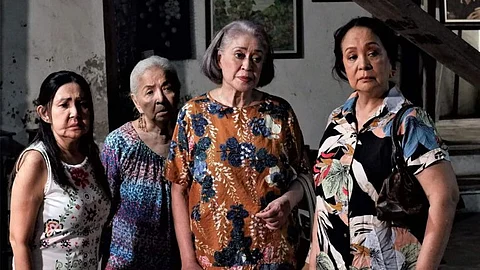
- NEWS
- the EDIT
- COMMENTARY
- BUSINESS
- LIFE
- SHOW
- ACTION
- GLOBAL GOALS
- SNAPS
- DYARYO TIRADA
- MORE

There is a poignant scene in Lola Magdalena where Dalena, a 60-year-old sex worker, bathes her dying friend with holy water from a giant tub she carried from their local Catholic parish. This simple yet desperate act of hope — that the amount of water could perhaps cure her friend’s cancer — is also Dalena’s way of cleansing Miriam, also a prostitute, of her sins.
But that’s not the only touching scene in Joel Lamangan’s low-budget, soapy comedy-drama about a group of hapless yet hopeful old women working in the oldest profession. From an earnest script by Dennis Evangelista and loosely based on true events, Lola Magdalena intimately zooms in on the lives of aging sex workers who know no other world but this de facto industry.
They reluctantly peddle their bodies in a small coastal province for P50 to P300 (one to six dollars) or, in some cases, are paid with ayuda (food parcels). These women cater to certain fetishes of a male clientele that ranges from cold-hearted strangers to caring comrades in a roadside whorehouse — a tiny hut with only red curtains for doors.
The film, while technically crude, is a smart and sympathetic dissection of these women as they navigate heartbreak, loss, betrayal, humiliation and, of course, poverty. Evangelista’s richly drawn characters render each woman delightfully distinct from one another, and their tales of suffering are equally absorbing and insightful.
There’s Dalena (Gloria Diaz), who hilariously works as a daytime faith healer; the lovestruck cougar, Luningning (Pia Moran); the lovelorn Corazon (Perla Bautista); Bella (Liza Lorena), whose drinking buddy is her estranged son; and the youngest, Miriam (Sunshine Cruz), who entered prostitution to keep her mother and siblings alive.
The heart of the film, though, is the bond that ties this gang of ballsy molls together. They have each other’s backs. Every evening, they strut together on the bridge — these feisty ladies of the night in their colorful garb and sagging breasts. Their will to survive trumps matters of shame or moral integrity.
The filming, though, feels rushed — as if crammed into a few days, with unrefined camera work and audio, and some of the actors stumbling over their lines. If you understand Filipino, you’d catch those uncomfortable pregnant pauses or stammering as they try to recall their lines. Some of the extras deliver amateur performances as well. But this only proves that substance and effective storytelling can overcome technical flaws.
Lamangan’s direction and Evangelista’s script save the movie from slipping into exploitative misery-porn territory. They cleverly approach the story’s heavy themes with humor and just the right amount of sentimentality, without sacrificing the subtle but piercing commentary on the sex trade in the Philippines.
The result is a riotous, touching and humane portrait of gutsy old women who are acutely aware of how society views them: a group of disposable sub-humans offering filthy entertainment, their bodies a sinful source of oxytocin and dopamine for the lonely, the stressed and the rejected. But the movie never looks down on these women or makes fun of them — it only shows us their humanity.
Lola Magdalena is an important watch for its benevolent portrait of a subculture and its realistic, unified depiction of a gamut of human experiences. The film neither judges nor justifies sex work; it merely mirrors a social issue with a profound knowledge of it. Despite the vulgar words thrown around and the ribald nature of the tale, it never feels dirty — rather, it’s an entertaining eye-opener.
3.5 out of 5 stars
Screening on 9 August at the ongoing Cinemalaya Philippine Independent Film Festival.
